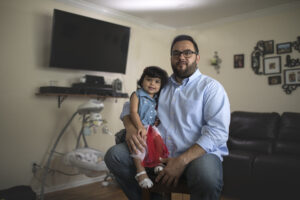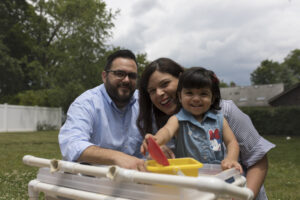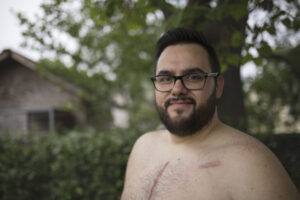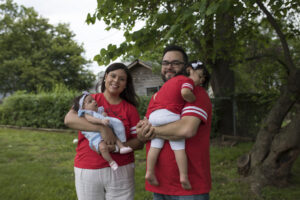Jason | Living with HCM
Somerset, New Jersey | Born July 1990
The idea that there is potentially a cure gives me hope for my girls. My biggest fear is that I’ve passed on this stupid gene to them, and everything that I’ve gone through, they would have to go through.
Destiny rushes across the room and surprises her dad, jumping into his lap as he sits on the couch. Thud! Jason catches her, lifting her by her arms further into his full embrace. Destiny laughs with delight, her Minnie mouse shirt contrasting her father’s button-down apparel. Jason lights up with a smile and coyly holds out his fist.
It’s a game Destiny knows well. She reaches out and gives him a fist-bump. She can anticipate what comes next, but plays along anyway. In a split-second, Jason’s hands have made their way to her belly. It’s a tickle-attack! Destiny squirms and squeals, unable to control her laughter until Jason puts her back down on the rug. She’s all smiles.
“Destiny is a ball of energy,” says Jason. “She loves to have fun. She’s very social, very open.” Their relationship centers around toddler acrobatics and the occasional rough-housing. Destiny loves being thrown into the air, and Jason loves everything that brings his daughter joy.

Fatherhood is still a relatively new experience for Jason, although it has certainly exceeded his highest expectations. “Before I became a father, I didn’t know how to interact with kids,” he says. “They were totally strange to me, but this little girl broke that in me.”
Across the room, Vanessa, his wife, holds baby Emma in her arms. At only two months old, she is a much quieter bundle of joy. “Emma is very observant,” remarks Jason. “She takes in everything that’s going on around her.”
Despite her quiet presence, Emma’s arrival to the family initiated a deep change in Jason, and prompted him to take decisive action against a serious health issue.
Jason lives with hypertrophic cardiomyopathy (HCM), a rare heart condition, where the interventricular septum of the heart thickens, hindering proper blood circulation. HCM is progressive in nature, and often leads to serious heart episodes. Through genetic tests, Jason learned that his HCM stems from a genetically inherited lack of myosin-binding 3 protein (due to a mutation in the MYBPC3 gene), which is important in maintaining cardiac muscle cell health.
Jason had to face some tough realities about his heart health soon after Destiny was born. At times, lifting her could be overly strenuous and exhausting and play time, or nap time became overly taxing. “When my HCM shows up in my life, it feels like a ton of bricks,” says Jason. “I have to sit down on the sofa. I want to get up and mow the lawn. I want to get up and clean the bathroom. I want to go for a walk, but I just can’t do it. I’m totally exhausted.”
So, when Jason learned Vanessa was pregnant again, he decided to take action. “I had my hands full with Destiny, my oldest child. I knew the second one coming was not going to be easier, it was going to make things more difficult… The thought of a two-year-old and a newborn—It was now or never.”
From previous consultations with physicians and trusted advice from an online patient community—specifically the HCM Facebook group—Jason knew that getting a septal myectomy, open-heart surgery, was his only viable option. The HCM community online continued to guide him through the process. “When it came time to get my septal myectomy, I reached out to someone on the HCM Facebook page who visits the same hospital as I do, who went to the same surgeons that I did. That was one of the biggest helps for me. It prepared me for what I was going to experience.”

The decision caused a wave of emotions for Vanessa. “I freaked out,” she admits. “I didn’t want him to get it. I was like what are they going to do? Are you going to survive? I imagined the worst.” To make matters more complicated, Jason’s surgery was scheduled for November 2020, in the midst of a raging COVID pandemic in the US. Vanessa was several months pregnant at the time, and to mitigate risk, she decided not to travel to Boston for surgery with her husband. “Luckily his mom was able to go with him,” says Vanessa, now far more relaxed about the situation. “It actually worked out really well.”
“It made it tougher—not having family around me at that time,” reflects Jason. “But I do feel it was the right decision to make.” His mother would visit him for a few hours each day as Jason convalesced. To his own amazement, he started to feel improvements before he even left the hospital—just walking around his floor with a nurse, he felt less tired. He could feel the sensation of more oxygen circulating throughout his body—his heart was working better.

“Now, I’m able to carry my daughter up the stairs,” he says. “Before the procedure, I couldn’t do that at all. I would get to the top and be totally winded. I’d reach for my inhaler to try and help me.” The myectomy however is not a permanent fix as there is no cure for HCM. But getting the procedure done early is allowing Jason to breathe a little easier—in more ways than one. “I really try to live every day like it’s my last. It’s taught me to enjoy every single day that I have. There is no moment too small for me, and I want to be there for all of them,” he says, with a sincerity that hits home. Jason, the family-man, knows all too well how everything can change in the blink of an eye.
Jason grew up surrounded by the Portuguese culture brought by his mother who immigrated to the US alongside numerous brothers and sisters. “My family is very large, very loud,” says Jason. He was raised in Newark, and much of his extended family lived close by in northern New Jersey. Due to their sheer number, family gatherings were usually memorable events, filled with a blend of Portuguese food and folk music.
On July 7, 2002, the family was gathering for a raucous summer barbecue. Jason was 11 at the time and he stood by the grill, enjoying the smoke-laced aroma of sausages wafting by him as he spoke with his uncle, Cândido. Cândido occupied a special place in Jason’s heart, and instilled in his nephew a sense of family loyalty. “He was always dropping whatever he was doing to help people around him,” remembers Jason. “No one had anything negative to say about him.”
Joking around, Jason gave his uncle a hardy slap on the chest before heading over to say hi to his cousins. Soon after he walked away, something abruptly changed. Cândido had begun talking to Jason’s grandfather when he suddenly lost consciousness and fell over, his grandfather catching him on his lap.
His cousin called 911, and Cândido was laid on the ground. The operator began walking her through CPR chest compressions. An ambulance was on the way, but it would not arrive soon enough. Maria, Cândido’s wife, along with Jason, his cousins, aunts, uncles, and grandparents, all watched Cândido take his last breath before his heart stopped from sudden cardiac arrest.
That day and its consequences have stuck with Jason well into adulthood. “For a while I blamed myself,” says Jason. Watching his uncle die at 47 years old from sudden cardiac arrest was traumatic, but provided an important clue to Jason’s yet unknown heart condition. “His death is still debated in the family. Some still say, ‘Oh he just had a heart attack, it’s not HCM.’” However, the trail of sudden cardiac deaths (SCDs) could not be ignored. “I know HCM runs on my mother’s side. Her aunt passed away when she was 13 years old. My maternal grandfather also died from sudden cardiac arrest.” Numerous SCDs in Jason’s family were a clear indication that he might have the disease.
At the age of 19, Jason started to suffer episodes of syncope, unprovoked losses of consciousness due to a drastic drop in blood pressure. Jason’s body would shake when he lost consciousness and doctors initially thought he had experienced a stroke. However, after his third episode of syncope, Jason went to the hospital and doctors decided to look at his heart muscle instead. They did an MRI and echocardiogram, and found a noticeable thickening of his left ventricle.
“Getting diagnosed with HCM at 20 years old couldn’t have been a worse time for me,” says Jason. Jason lived a fast-paced life that he didn’t want to slow down. “I was still invincible. Nothing could stop me.” Right after diagnosis, his doctor recommended placing an implantable cardiac defibrillator (ICD) in Jason’s chest to protect him against cardiac arrest, but Jason didn’t heed. He checked himself out of the hospital. “I said, ‘I don’t need this. I’ll survive anything.’” It was a decision he would later regret.
A year later, the same doctor called Jason back and implored him to reconsider. “I didn’t have insurance,” Jason recalls. “I didn’t have the money to pay for it.” However his doctor offered the procedure for free, insisting that this was nothing to be taken lightly. His concern and sincerity about the situation was convincing. Though it had now been over nine years, Jason was reminded of his uncle and the barbecue where he died. He had never made the connection before, but it suddenly seemed quite possible that the same fate awaited him if he didn’t take steps to mitigate his genetic heart condition.

Jason opted to get an ICD placed that year. Soon after, he met Vanessa, and before the two ever got serious, he attempted to explain some details about his heart. “When we first met, he told me he had a pacemaker, and to be honest, I didn’t know what that was,” says Vanessa. “I was like, ‘How old are you?’” Jason chuckles and adds: “That was my hook—to get her to feel sympathy for me.”
Over the last decade Vanessa has learned a lot about HCM, and had to make adjustments in her own life to support her husband. “It’s been a journey for me too,” she says. “I never knew HCM even existed. I don’t know what it is like to live with a heart condition.” She has had to accept that Jason will not always be able to do what he or she wants, things that can seem incredibly simple—like going for long walks. “It’s not that he doesn’t want to be active,” she relays. “It’s just a symptom of his condition.” Luckily, as a Montessori school teacher, Vanessa has an incredible knack for all things related to children and helps with upkeep of the house.

Purchasing a home for his family was a watershed moment for Jason, a culmination of years of hard work and a symbol of upward mobility. Home ownership was a difficult dream to attain. His family was mostly working class, and there was no great repository of cash on hand. Jason solidified a career in real estate finance, and excelled at the trade, which, somewhat appropriately, turned his dream into a reality.
In the face of the unknowns of HCM, Jason aims to provide real stability for his wife and two daughters, something that cannot afford to be taken for granted. “My biggest motivation is giving them the life I never had,” says Jason. There were many things he wished for as a child, but did not have. “Watching Destiny run around the backyard brings me the most joy. I never had that. Knowing that I’m giving that to my daughter, it makes it all worthwhile.” Vanessa appreciates the dedication and sacrifices Jason has made, to manage his condition while growing and helping to support their family. “I love that about him,” she says, “That his family is everything to him. He gives anything for his family.”
The searing sounds of fish, chicken, and vegetables hitting the grill rack blend with the laughter and playfulness of Destiny, running circles around her parents. Summer weather has just arrived in New Jersey, and Jason couldn’t be happier about it. He skillfully turns the filets, keeping them intact, and then grabs a handful of seasoning and lays it on generously. The porch, the backyard, the grill—his dreams have materialized in ways he could never imagine. In moments like this, Jason is content.
However, home ownership has also unearthed new responsibilities, many that require physical labor that can be especially challenging on warm summer days. It has been hard for Jason to accept that some of those tasks are too much for him. Doing repairs, renovations, or mowing the lawn, are all calculated risks, knowing that overexerting himself can effectively put the rest of his day on hold.
“It’s frustrating because people look at me and see that nothing is wrong with me. They see a young, healthy guy.” Accepting HCM is something Jason has been forced to do, but for the outside world, his disability remains invisible. Even when he tries to explain his condition, people don’t understand, and think that his problems are strictly due to some lack of willpower. “People tell me to exercise more,” he says. “It doesn’t work that way. It’s something I can’t control. Obviously diet and exercise helps, but it doesn’t fix my condition.”
New developments in the field of medicine are striving to alleviate some of the worst effects of HCM, something that fills Jason with hope and possibility. “In the HCM community, there is not a lot of research that takes place… So, the idea that there is a company focused on HCM, on my mutation—there is so much gratitude there. It makes me feel like I matter, like my family matters.”
Jason’s optimism is not without risk. There will come a time when Destiny and Emma both will need to get tested knowing that much of their lives could be dictated by managing HCM. For this reason, Jason is beyond grateful that drug companies are funding research and clinical trials for his condition. “The idea that there is potentially a cure—that gives me hope for my girls. My biggest fear is that I’ve passed on this stupid gene to them, and everything that I’ve gone through, they would have to go through.” The dominant inheritance pattern does not work in their favor, but perhaps their timing, along with a life-saving medical intervention, will.
“This is important work,” he says to the researchers working on treatment for HCM. “It’s saving families. It’s saving fathers, sons, daughters. It’s preventing families from being torn apart. HCM is a tough, tough disease to live with. I’d give anything in the world to not have to deal with HCM.”

